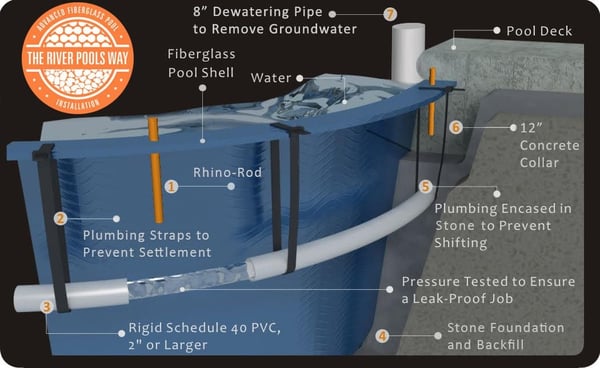Ah yes, the relaxing rush of a waterfall. Such a beautiful, soothing noise…until you remember that you’re sitting by your pool and didn’t install a waterfall. Yikes.
Leaks are inconvenient but also, more important, expensive to find and repair—from several hundred to several thousand dollars, depending on the type of pool, the type of leak, and whether you locate and repair the leak yourself or hire a professional.
Even worse, if you have a leak from a salt-water system in a vinyl liner pool with metal wall panels, the salt will quickly corrode the wall panels, adding even more repairs to your bill.
Your best option is to plan ahead, during construction. When you know what causes leaks, you have a better chance of preventing them.
Three different areas of the pool can leak:
- Structure
- Fittings
- Plumbing
Structural leaks
A leak in the structure of the vessel itself is a structural failure to hold water.
In a fiberglass pool, this would be a crack through the laminate. In a vinyl liner pool, this would be a puncture or slice in the liner, or a failure of the seam. In a concrete pool, it would be a structural crack in the concrete.
Fiberglass pools are the least likely to leak structurally.
Compared to a concrete pool, fiberglass is incredibly flexible so it can move and shift with its environment without cracking.
Compared to a vinyl liner pool, the pool shell is very thick and durable as opposed to a thin vinyl liner with many seams.
With a vinyl liner, there’s an almost 100% guarantee that the pool will eventually leak. The way you know it’s time to replace your liner is that the pool is leaking: the ability of the liner to hold water has been compromised.
Rankings for structural integrity:
- Fiberglass pools
- Concrete pools
- Vinyl liner pools
Fitting leaks
A fitting is any penetration through the pool shell—primarily skimmers, lights, and return fittings (like jets).
A leak around the fittings in the pool isn’t an issue with the structure, but rather with an area where water already travels in and out.
Fiberglass pools are least likely to leak because they have no seams. The manufacturer cuts a hole out of the shell at exactly the right size for the fitting and then seals that with 100% silicone. We can see both sides of the pool shell clearly, use a sealant that’s easy to apply, and have very little failure rate at the fittings.
On a vinyl liner pool, there’s a lot more potential for leaking because the penetrations and seams in the liner are all underwater—steps, buddy seats, skimmers, drains, lights, return fittings, and plain old seams in the liner.
Concrete by its nature is not watertight. The builders leave a cavity in the pool shell with plumbing, put the fitting in, and pack plaster around it. There’s no actual sealant required, so skimmers, returns, and lights are prone to leak.
Rankings for fittings integrity:
- Fiberglass pools
- Concrete pools
- Vinyl liner pools
Plumbing leaks
Like your most emotional friends, the plumbing needs lots of support to function at its best. This aspect isn’t specific to the pool type, but rather to the way the builders run the plumbing. The way the plumbing is installed will influence whether or not it leaks. Basically, the plumbing needs support because if it moves, it leaks.
You need to secure the plumbing during installation. It may move if it’s just run out and left to float in dirt or backfill material. If it’s supported by plumbing straps or if it’s solid and run down to the ground, it won’t move.
If you install plumbing correctly in any pool, you won’t have issues. As part of The River Pools Way, we’ve developed an advanced installation methodology that virtually eliminates leaks of all kinds in fiberglass pools because it supports the plumbing.
Basic techniques in our advanced Installation apply to all pool types:
- A plumbing strap to hold the plumbing up
- Stone backfill that doesn’t move or shift
- Rigid, not flexible, PVC pipe

Solution: fiberglass pool shell with supported plumbing
Our opinion is that a fiberglass pool installed with The River Pools Way: Advanced Installation is the most leak-resistant of all three pool types in terms of structure, fittings, and plumbing if installed correctly.
If you’d like to learn more about fiberglass pools, feel free to visit our learning center or contact us directly to ask questions and request pricing. You can also leave your questions in the comments below.
If you're still not sure which inground pool type is right for you, read this comparison of the three pool types and download our free ebook below. Thanks and happy swimming!

Up Next:
What Type of Inground Pool Is Best for Me?
Removal and Cost of Hitting Rock or Water During Inground Pool Construction
Inground Swimming Pool Maintenance Costs: Chemicals, Electricity, and More
Editor's note: This blog article was updated on April 2, 2019.